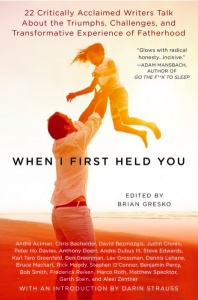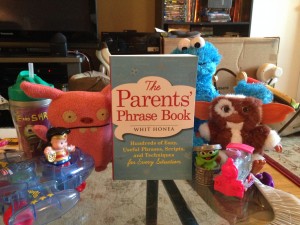Have you bought a Father’s Day gift for that special dad in your life yet? No? Good. Because I have a great suggestion. When I First Held You, an anthology of 22 personal essays from contemporary male writers such as Dennis Lehane and Andre Dubus III is a triumphant collection that digs deep into what it means to be a father.
Edited by Brian Gresko, the book shakes you with incredibly honest accounts of fatherhood guilt and frustration, child health crises, horrifying feelings of failure (something I especially relate to), renewed faith in a higher power, the effect of divorce on a child, etc. And there’s humor, of course. Lots of vomit. Lots of poop. Lots of crying. It’s a book that as Gresko writes, helps “inspire you to be the best parents you’re capable of being, knowing that you’ll never be as good as you want to be.” And it sure does.
I’m a full-time stay-at-home father batting depression and anxiety and as much as I love my 2-year-old daughter, I too often succumb to panic attacks and oppressive pits of despair because I didn’t do something right for my child, because I got angry and yelled, because I have trouble believing that I’m providing my daughter with life filled with learning and wonder and joy. I beat myself up. I call myself a failure. This book filled with wonderful narratives help you see that the struggles and beauty that come with parenting are universal. I’m not the only one feeling these things. I need to forgive myself for my parenting mistakes and appreciate my daughter’s utter glee at seeing bubbles. Because that’s special and it won’t last forever.
Some of my favorite passages:
“When you watch your kids begin to grow up, you cannot help but feel your impermanence more acutely; you cannot help but see how you are one link in a very long chain of parents and children, and that the best thing you have ever done and ever will do is to extend that chain, to be a part of something greater than yourself. That’s really what it means to be a father.” – Anthony Doerr
“In the stillness I move between the two beds…The silence of the room is like the silence of a photograph. Here the girls are fixed, they lie quietly outside of time…The girls might stir or murmur, but they don’t say a word. Not one word. I lean down toward each girl in turn to listen to what she does not say. How conspicuous, how marvelous is their silence! Because during the daylight hours, while awake and in our house or cars or backyard, these extraordinary girls, these two sources of wonder and light, almost never shut their mouths.” – Chris Bachelder (emphasis not added)
“My father loved to play. He still loves to play. How lucky are the children whose fathers genuinely love playing with them! I have been one of those children, and so it saddens me greatly that I have never been, and likely will never be, one of those fathers.” – Bruce Marchart (emphasis not added)
What a wonderful compendium of darkness and light, sadness and jubilation, and all around gorgeous writing is When I First Held You. Delve into these stories. Soak them in. Learn from them. Feel them. Because as a father, they represent you. They might not exactly mirror your personal tale, but the reflection is true and real and gorgeous.
And while When I First Held You is about the trials, tribulations and discoveries of fatherhood, it’s a book that any parent can enjoy, especially one that is a fan of great writing. Included in the book are the following writers:
Andre Aciman, Chris Bachelder, David Bezmogis, Justin Cronin, Peter Ho Davies, Anthony Doerr ,Andre Dubus III, Steve Edwards, Karl Taro Greenfriend, Ben Greenman, Lev Grossman, Dennis Lehane, Bruce Machart, Rick Moody, Stephen O’Connor, Benjamin Percy, Bob Smith, Frederick Reiken, Marco Roth, Matthew Specktor, Garth Stein, Alexi Zentne
When I First Held You is a terrific book that tackles some tough topics, teaches us what it means to be a father in today’s ever-changing world, and delves into the mysteries of parenthood in different writing styles all of which are captivating.
So this Father’s Day, pick up When I First Held You for a dad – any dad. Or actually, just pick one up for yourself or anyone who loves a magical read.
Note: I greatly appreciate Brian Gresko providing me with a review copy of this book


